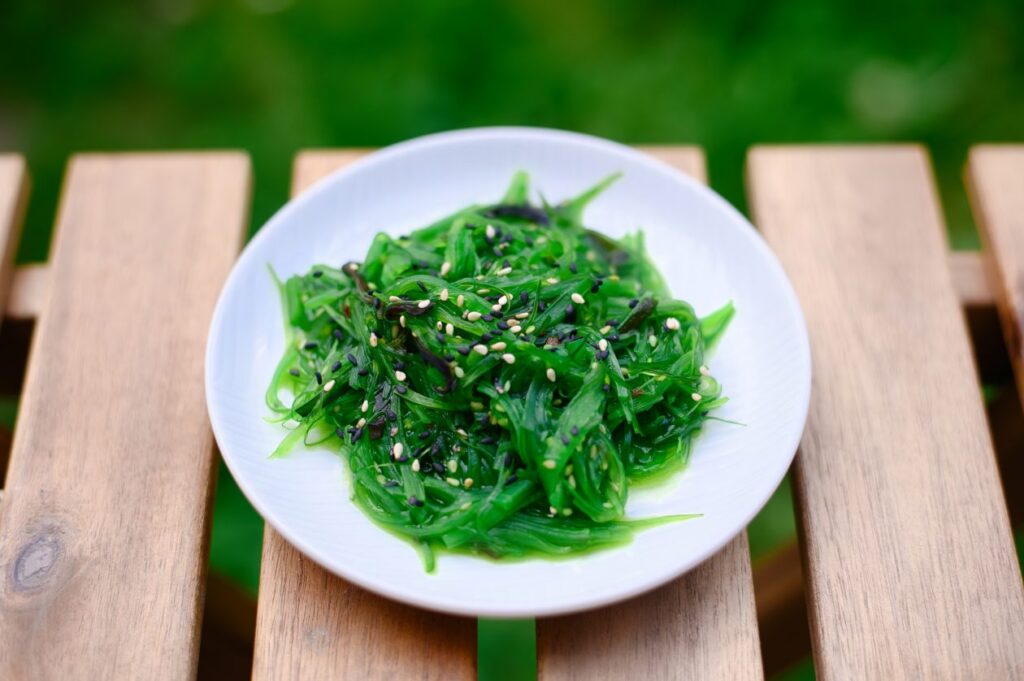Introduction
Seaweed, often recognized for its abundance in the ocean, has recently garnered attention in the world of nutrition, particularly about the ketogenic (keto) diet. As individuals increasingly seek low-carb alternatives to traditional foods, questions arise about the compatibility of Seaweed with the keto lifestyle. Exploring the nutritional composition of Seaweed and its impact on ketosis provides valuable insights into its suitability for those following a ketogenic diet.
The ketogenic diet, characterized by its high-fat, low-carb, and moderate-protein approach, has surged in popularity due to its potential benefits for weight loss, blood sugar regulation, and increased energy levels. With an emphasis on reducing carbohydrate intake to induce a metabolic state called ketosis, keto enthusiasts continuously seek diverse food options that align with their dietary preferences and health goals.
Due to its nutrient-rich profile and minimal carbohydrate content, Seaweed is a promising option for individuals adhering to the keto diet. With various types of Seaweed available, ranging from nori to kelp, exploring their nutritional attributes and culinary versatility can offer keto enthusiasts an exciting array of choices to incorporate into their meal plans. As we delve deeper into the discussion, we’ll uncover the nutritional content of Seaweed and its potential role in supporting ketosis while providing practical tips for seamless integration into a keto lifestyle.
Understanding the Ketogenic Diet
The ketogenic diet—also referred to as the “keto” diet—is an eating plan distinguished by high fat, low carbohydrate, and moderate protein content. This macronutrient ratio aims to cause the body to enter a metabolic state known as ketosis, in which fats replace carbs as the body’s primary fuel source. Those who follow the ketogenic diet seek to get their bodies to enter this metabolic state, linked to several health benefits, by significantly lowering their carbohydrate intake and increasing their fat consumption.
The metabolic condition known as ketosis occurs when the body breaks down fat to make ketone bodies, which are used to power several biological processes, including energy synthesis. When the body doesn’t have enough carbohydrates, the liver breaks down fatty acids into ketones, which the body’s cells—including those in the brain—can use as an alternate energy source. People following a ketogenic diet can efficiently burn fat for energy thanks to this metabolic adaption, which speeds up fat reduction and enhances metabolic health.
The possible benefits of the ketogenic diet include improved blood sugar regulation, increased energy, and weight loss. People who prioritize fat as their primary fuel source may feel more satisfied, have fewer cravings and have more consistent energy levels all day. Furthermore, studies indicate that people with specific medical disorders, like epilepsy and metabolic syndrome, may benefit from the ketogenic diet; nevertheless, further research is necessary to clarify the diet’s long-term health consequences.
Seaweed: Nutritional Profile

Seaweed, which includes a variety of marine plants and algae, is a nutritional powerhouse that contains a wide range of essential nutrients. This marine flora significantly complements various dietary patterns because it provides a unique combination of macronutrients and micronutrients. Seaweed is widely known for its health advantages and variety in cooking. It is an excellent source of vitamins, minerals, and phytonutrients vital for a healthy body.
Seaweed’s shallow carbohydrate content makes it a distinctive food that fits well with ketogenic diets. Because Seaweed has very few carbohydrates, it is a good choice for people following the rigorous carbohydrate limitations of the keto diet. This quality makes Seaweed an attractive option for preserving ketosis, a metabolic state in which burning fat produces energy.
Seaweed comes in various forms, each with unique health-promoting qualities and nutrient profiles. For example, nori, frequently used in sushi, is an excellent choice for keto diets due to its trace carbohydrate level and low-calorie value. Meanwhile, kelp, known for having a high iodine concentration, is a beneficial complement to support thyroid function. Making educated dietary decisions in line with one’s preferences and nutritional objectives is made possible by thoroughly understanding the nutritional subtleties of different types of Seaweed.
Is Seaweed Keto Friendly?

Seaweed is indeed keto-friendly due to its low carbohydrate content, making it suitable for individuals following ketogenic diets.
Seaweed is a favorable option for those on a keto diet primarily because of its minimal carbohydrate content. Most seaweed varieties containing deficient levels of net carbohydrates fit comfortably within the keto framework, helping individuals maintain ketosis without compromising their dietary preferences.
Beyond its low carb count, Seaweed offers additional benefits for individuals striving to achieve and maintain ketosis. Rich in minerals like iodine, Seaweed supports thyroid function, which is crucial for metabolic health and the efficiency of ketosis. Seaweed contributes to overall metabolic balance by providing essential nutrients, enhancing the body’s ability to sustain a ketogenic state.
Seaweed’s fiber content supports digestion, particularly on a high-fat diet like keto. Fiber aids in regulating bowel movements and promoting gut health, which can benefit individuals consuming increased amounts of dietary fat. Incorporating Seaweed into a keto diet helps maintain ketosis and supports digestive health, ensuring a holistic approach to dietary wellness.
Health Benefits of Seaweed in a Keto Diet

Seaweed is a valuable addition to a ketogenic diet due to its rich iodine content, which supports thyroid function. The thyroid gland regulates metabolism, making it essential for individuals striving to maintain a state of ketosis. Individuals can support thyroid health by incorporating iodine-rich Seaweed into their diet, ensuring optimal metabolic function while adhering to a keto lifestyle.
Beyond its iodine content, Seaweed boasts antioxidant properties that offer potential benefits for individuals on a ketogenic diet. These antioxidants help combat oxidative stress and reduce inflammation, common concerns among those transitioning to a high-fat, low-carb diet. By incorporating Seaweed into their meals, individuals can mitigate inflammation and support overall health while pursuing their keto goals.
Moreover, Seaweed is a nutrient-dense source of vitamins and minerals essential for overall health. Seaweed provides various micronutrients, from vitamin C to magnesium and calcium, contributing to different bodily functions. Including Seaweed in a keto diet ensures that individuals maintain ketosis and meet their nutritional needs, promoting optimal health and well-being.
By recognizing the multifaceted health benefits of Seaweed, individuals can leverage this nutritious marine plant to enhance their ketogenic journey, supporting metabolic health, reducing inflammation, and effectively meeting their daily nutrient requirements.
Incorporating Seaweed into a Keto Diet
Seaweed snacks offer a unique and flavorful way to enhance the keto diet. Consider using roasted seaweed sheets as a crunchy alternative to chips or crackers. You can also crumble them over salads or soups for added texture and a hint of umami flavor. For a more substantial meal, wrap grilled seafood or low-carb veggies in nori sheets to create delicious sushi rolls without the rice.
One of the standout features of seaweed snacks is their versatility. Whether enjoyed straight out of the pack or incorporated into various dishes, seaweed snacks provide a satisfying crunch and a burst of oceanic flavor. From nori strips to crispy seaweed chips, these snacks offer a guilt-free way to satisfy cravings while staying true to the keto lifestyle.
While seaweed snacks can be a tasty addition to a keto diet, consuming them in moderation and as part of a balanced eating plan is essential. While low in carbs, seaweed snacks can still contribute to overall calorie intake. Additionally, some varieties may contain added oils or seasonings that can affect their nutritional profile. Be mindful of portion sizes and opt for minimally processed seaweed snacks whenever possible to reap the full benefits of this nutrient-rich superfood.
FAQ about Seaweed and Keto
Q: Does Seaweed have carbs?
A: Yes, Seaweed does contain carbohydrates, but the amount varies depending on the type of Seaweed and its preparation. Generally, Seaweed is low in carbohydrates, making it suitable for a keto diet.
Q: Is seaweed paper keto-friendly?
A: Yes, seaweed paper, or nori, is keto-friendly as it is typically shallow in carbs. It’s commonly used to make sushi rolls without rice, making it a popular choice for those following a ketogenic diet.
Q: Will one cheat day ruin ketosis?
A: While one cheat day can temporarily kick you out of ketosis, it doesn’t necessarily ruin your progress in the long term. However, frequent cheat days can hinder your keto journey and make it more challenging to achieve your goals.
Q: Is sea salt OK for keto?
A: Sea salt is suitable for a keto diet as it contains no carbohydrates. It’s an excellent choice for replenishing electrolytes, which can become depleted on a low-carb diet like keto.
Q: Will Seaweed break ketosis?
A: In most cases, Seaweed is unlikely to break ketosis due to its low carbohydrate content. However, checking the nutritional information and avoiding seaweed products with added sugars or high carbohydrate counts is essential.
Q: Is Seaweed OK for weight loss?
A: Seaweed can benefit weight loss due to its low calorie and fat content and high fiber content, which can promote feelings of fullness and reduce calorie intake.
Q: Is Seaweed zero carbs?
A: While Seaweed is low in carbohydrates, it’s not necessarily zero carb. The carbohydrate content may vary depending on the type and preparation of the Seaweed.
Q: Is dried Seaweed a carb?
A: Dried Seaweed does contain carbohydrates, but the amount is typically low, making it a suitable option for those following a low-carb or keto diet.
Q: Is dried Seaweed a healthy snack?
A: Yes, dried Seaweed can be a healthy snack as it is low in calories and fat, high in fiber, and packed with essential vitamins and minerals.
Q: How much Seaweed is too much?
A: While Seaweed can be a nutritious addition to your diet, consuming too much may lead to excessive iodine intake, adversely affecting thyroid health. Enjoying Seaweed in moderation as part of a balanced diet is best.
Q: Is Seaweed healthier than chips?
A: Seaweed is generally considered a healthier alternative to chips as it is lower in calories and fat, higher in fiber, and contains beneficial nutrients such as vitamins and minerals.
Q: What are the three types of Seaweed?
A: Seaweeds can be classified into three broad groups based on pigmentation: brown, red, and green. These groups are referred to as Phaeophyceae, Rhodophyceae, and Chlorophyceae, respectively, by botanists.
Conclusion
Seaweed is a potential ally for ketogenic dieters with its high nutritional value and low carbohydrate content. Its ability to provide a pleasing crunch without causing one’s carb consumption to spiral out of control makes it compatible with the keto lifestyle. In addition, Seaweed’s abundance of vitamins, minerals, and antioxidants provides value beyond its carbohydrate content, making it a popular option for keto enthusiasts looking for flavor and health advantages.
When people navigate the complex terrain of nutritional options, Seaweed emerges as a wholesome and practical snack alternative. Because of its adaptability, it can be enjoyed independently as a filling snack in between meals or creatively incorporated into meals. Readers can increase the variety of nutrients they consume while adhering to their dietary objectives by including Seaweed in their ketogenic diet.
Even though Seaweed has several advantages when used in a ketogenic context, it’s essential to consider all factors when making dietary choices. A varied and well-balanced diet rich in nutrient-dense foods like Seaweed promotes general health and well-being. Urge readers to prioritize mindful eating, paying attention to their bodies, and seeking individualized advice from medical professionals to achieve optimal nutrition and well-being.
People can improve their nutritional profiles and gastronomic experiences while promoting a more holistic approach to health and wellness by adding Seaweed to their ketogenic diet. Allow Seaweed to assist your quest for life and vitality by becoming a tasty partner on your ketogenic path.
Reference:
(1) How does the thyroid gland work?
https://www.ncbi.nlm.nih.gov/books/NBK279388/
(2) 7 Hypothyroidism-Friendly Foods to Add to Your Diet
https://www.everydayhealth.com/hs/thyroid-pictures/foods-to-eat/
(3) 7 Surprising Health Benefits of Eating Seaweed – Healthline
https://www.healthline.com/nutrition/benefits-of-seaweed
(4) Seaweed Fertilizer Prepared by EM-Fermentation Increases Abundance
https://www.mdpi.com/2311-5637/8/2/46
Was this helpful?

Joseph Emb, RDN
Founder of StyleVitally.com | Registered Dietitian & Wellness Advocate
What I Cover:
I’m passionate about connecting nutrition science and everyday wellness to help people live healthier, more vibrant lives. I write about evidence-based nutrition, mindful eating, sustainable lifestyles, and holistic well-being at StyleVitally.com.
My Background:
The University of Texas in Austin, where I earned my Dietetics diploma, laid the groundwork for my nutrition and health career. My training and hands-on experience taught me the science and art of using nutrition to enhance health and well-being.
Professional Journey:
I’m an RDN with lots of experience. I’ve helped people seeking tailored nutritional recommendations in clinical settings and community outreach programs. My constant learning and professional development ensure that my recommendations are always based on the latest evidence.
Ethical Commitment:
My practice prioritizes integrity. My content is transparent and objective, following the most significant ethical standards. I can give my audience unbiased advice because I’m not affiliated with food businesses or industry associations. I want to help people make informed health decisions that match their values and ambitions.
Join Me on the Wellness Journey:
Join me on the path to vitality and well-being, whether facing nutritional issues, seeking sustainable lifestyle changes, or simply wanting a better, happier you. We’ll discover how diet, mindfulness, and holistic well-being can maximize your potential.









